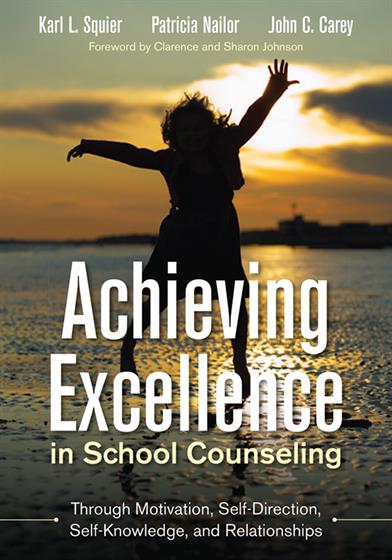
Hands-on, Practical Guidance for Educators
From math,
literacy, equity, multilingual learners, and SEL, to assessment, school counseling,
and education leadership, our books are research-based and authored by experts
on topics most relevant to what educators are facing today.
Achieving Excellence in School Counseling through Motivation, Self-Direction, Self-Knowledge and Relationships
Foreword by Clarence and Sharon Johnson
This groundbreaking guide describes essential resources and in-depth analyses of Construct-Based Approach counseling strategies, action steps and measures for a comprehensive, results-based school counseling program.
- Grade Level: PreK-12
- ISBN: 9781483306728
- Published By: Corwin
- Year: 2014
- Page Count: 208
- Publication date: May 28, 2014
Price: $39.95
For Instructors
When you select 'request review copy', you will be redirected to Sage Publishing (our parent site) to process your request.
Description
A new research-based approach to the design, delivery and evaluation of K–12 school counseling programs
Learn about a Construct-Based Approach (CBA) to school counseling that uses four research-based constructs to focus school counseling programs on areas that can significantly increase the impact on student achievement and school improvement. Discover essential school counseling processes in which all students participate: student planning, academic support, college and career readiness, and personal growth and social interaction.
The authors, leading educational experts, use research to refocus attention on student results, a challenging results-based school counseling curriculum, and meaningful student assessments. See examples of how a CBA looks in practice with the following:
- In-depth analysis of student standards and competencies
- Developmentally-appropriate scope and sequence
- Documented curriculum activities
- Sample student assessments
An online toolkit consisting of electronic files with structured processes, clearly-defined protocols and easy-to-use tools to help implement a CBA is also available.
This groundbreaking approach can help transform your counseling program. You will love it. Your students will love it. Get started today! Visit www.excellenceinschoolcounseling.com for more information, including online and onsite consulting services that are available.
Key features
- Presents standards that are explicitly research based, thus they can be measured with reliability and validity
- Emphasizes 21st century skills and that ways that today's students learn best
- Focuses on four extensively researched constructs: motivation, self-direction, self-knowledge, and relationships.
- Contains a Starter Kit for counselors who want to transform their current program into a construct-based program, offering numerous knowledge exercises plus other tools, instruments and templates.
Author(s)

Karl L. Squier
Dr. Karl Squier is President of Lady of the Lake Learning Systems, a consulting organization specializing in K-12 school counseling and school improvement initiatives. His professional interests include building communities of dialog and self-reflection, designing school counseling programs based on standards of excellence, delivering a challenging school counseling curriculum that maximizes students’ potential for learning, using assessments that enable students to continuously improve their learning, and evaluating the impact of delivering a school counseling program on student achievement and school quality. Dr. Squier is a long-time advocate of school counselors as fundamental to quality schools and student achievement. He is a recipient of a Rhode Island School Counselor Association’s (RISCA) School Counselor Advocate of the Year Award.

Patricia Nailor
Dr. Patricia Nailor has worked as a counselor practitioner in public schools and has served as a founding member and president of the Rhode Island School Counselor Association (RISCA). She has also served as president of the American School Counselor Association (ASCA). Dr. Nailor retired as Director of the Department of Counseling and Social Services in the Providence Public Schools. Currently she is an adjunct instructor at Providence College where she teaches in the Counselor Education Program. Dr. Nailor manages the school counseling consulting services of Lady of the Lake Learning Systems. She is the recipient of a RISCA Lifetime Achievement Award, given in recognition of a lifetime of dedication and service to students, and to building and promoting the school counseling profession.

John (Jay) C. Carey
Dr. John Carey is Director of the Ronald H. Fredrickson Center for School Counseling Outcome Research & Evaluation and Professor of School Counseling at UMASS Amherst. He is a recipient of an American School Counseling Association (ASCA) Counselor Educator of the Year Award. Dr. Carey is included on the Fulbright Specialist Roster and works internationally to improve school-based counseling and school counselor education. His research interests include school counseling outcome measurement, policy research in school-based counseling, standards-based models of school counseling, and the development of research-based interventions to promote academic achievement and eliminate the achievement gap. He is coeditor of Multicultural Counseling in Schools: A Practical Handbook.
Table of Contents
Dedication
Table of Contents
Foreword
Acknowledgments
About the Authors
1. Introduction
Purpose of Book
How Book Chapters are Organized
Book Chapter Descriptions
From Concept to Practice
CBA Toolkit Components
Construction Site Components
Chapter 1 Construction Zone
2. A Simple Language Set
Importance of the Language We Use
Construct
Context
Results
Curriculum
Student Assessment
Program Implementation and Evaluation
How the Terms in the Language Set Relate
Standards and Competencies are the Foundation of the Curriculum
Chapter 2 Construction Zone
3. Research-Based Constructs
Definition of Research-Based
New Focus on Personal, Social and Life Skills
Motivation
Self-Knowledge and Self-Direction
Relationships
Conclusions
Chapter 3 Construction Zone
4. Relevant Contexts for K-12 School Counseling Programs
From Constructs to Contexts
Competency Statements Emerge from Contexts
Contexts Consist of Essential Processes
Academic Support
Chapter 4 Construction Zone
5. Student Results (Standards and Competencies)
Achieving Excellence
Counseling-Learning Environment (CLE)
Two Types of Student Results
Construct-Based Student Standards
A Vision to Live By
Competencies as Proficiency Builders
Writing Meaningful Competency Statements
A Focus on Cognitive Skill Development
A Focus on Metacognitive Skill Development
Role of School Counselors
Chapter 5 Construction Zone
6. Role of Curriculum in a CBA
Where We Are in the CBA Building Process
Essential Characteristics of a CBA Curriculum
Principles for Learner Centered School Communities
Results-Based CBA Curriculum in a Nutshell
Chapter 6 Construction Zone
7. Assessing Student Progress toward CBA Counseling Standards
CBA Student Proficiency Assessments
Assessing Current Levels of Competency
Assessing Gains after Interventions
Assessing Progress towards Standards at Key Transition Points
Assessing Curriculum-Related Proficiencies
Importance of Linking CBA to Research-Based Constructs
Chapter 7 Construction Zone
8. CBA Program Implementation: Focus on Planning
Shift in Focus from Building to Implementing a CBA
How to Begin
Why All the Fuss About Planning?
Three Perspectives on the Planning Process
Four Types of Plans
Chapter 8 Construction Zone
9. CBA Program Implementation: Focus on Program Delivery
Delivering a CBA Program with Fidelity
Data Management
School Counseling Data Management System
Chapter 9 Construction Zone
10. BA Program Implementation: Focus on Evaluation
Program Evaluation is an Improvement Process
What Needs to be Evaluated
Chapter 10 Construction Zone
11. CBA’s Contribution to School Improvement Initiatives
Contribution to Current Practice
Contribution to Knowledge and Skill Requirements Initiatives
ACT’s Five Principles
CBA Contribution to School-Based Intervention Initiatives
Toward a More Holistic View of Student Learning
Chapter 11 Construction Zone
12. Power and Potential
What is Power and Potential?
A Vision to Live By
Summary of Key Points
School Counselor Accountability
References
Reviews
"This book takes a vital next step for the school counseling profession by defining what results we expect students to achieve based on research. Not only do the authors propose standards for student excellence, but also demonstrate the importance of delivering meaningful learning opportunities and assessing student proficiency and achievement."From the Foreword by Clarence Johnson and Sharon Johnson
"The authors present a systematic roadmap for implementing the innovative and promising Construct-Based Approach to school counseling. This research-based approach will assist counselors and schools in targeting student skills and competencies that are vital for student achievement and success, specifically motivation, self-direction, self-knowledge, and relationships."
Jon M. Shepard, School Psychologist"The authors present a systematic roadmap for implementing the innovative and promising Construct-Based Approach to school counseling. This research-based approach will assist counselors and schools in targeting student skills and competencies that are vital for student achievement and success, specifically motivation, self-direction, self-knowledge, and relationships."
Denton Independent School District, Denton, Texas
"The authors provide a new model for school counseling interventions, ensuring that every K-12 student has specific competencies in four key school counseling standards from educational success research."
Stuart Chen-Hayes, Associate Professor & Program Coordinator, Counselor Education/School Counseling"The authors provide a new model for school counseling interventions, ensuring that every K-12 student has specific competencies in four key school counseling standards from educational success research."
Lehman College of the City University of New York
"This pioneering book takes the ASCA National Model to a new level. With over 50 years of research in how the brain functions and how students learn school counselors will find this book extremely helpful in their implementation of the ASCA National Model as it defines roles for administrators, parents, teachers, and the community."
Judy Bowers, School Counselor Consultant"This pioneering book takes the ASCA National Model to a new level. With over 50 years of research in how the brain functions and how students learn school counselors will find this book extremely helpful in their implementation of the ASCA National Model as it defines roles for administrators, parents, teachers, and the community."
“For the first time, we have a comprehensive school counseling curriculum built on more than fifty years of research designed around four main constructs supporting students’ success: (a) motivation, (b) self-direction, (c) self-knowledge, and (d) relationships. Any person passionate about designing a proactive, research-based approach to school counseling will love this book. The Construct-Based Approach (CBA) detailed by Squier, Nailor, and Carey is grounded in data-based decision making, strategic program implementation and ongoing evaluation. CBA is focused on enhancing students’ “self-direction or self-determination skills”. These factors have been shown to be more closely associated with future success than academic skills or performance on achievement tests. The constructs and strategies in this book are designed to ensure that all students are successful in school and, more importantly, throughout their life. This book shows school counselors how to make a measurable difference in students’ lives. School counselors will appreciate how the authors connect the strong research base to a curriculum laid out clearly in scope and sequence, with activities, interventions, and assessment strategies included. In fact, as school counselors examine the curriculum, they will find many issues they encounter daily through responsive services. Through this approach, however, school counselors have an intentional, planned sequence for equipping all students with the knowledge, behaviors, and skills they need to be successful, while targeting sub-populations that need additional support. Crisis requiring responsive services will be reduced tremendously as a result. I highly recommend this book for any school counselor in-training, beginning school counselor, school counselor who wishes to evolve current practices, or any school looking to make a measurable impact in students’ lives!”
Brett Zyromski Associate Professor“For the first time, we have a comprehensive school counseling curriculum built on more than fifty years of research designed around four main constructs supporting students’ success: (a) motivation, (b) self-direction, (c) self-knowledge, and (d) relationships. Any person passionate about designing a proactive, research-based approach to school counseling will love this book. The Construct-Based Approach (CBA) detailed by Squier, Nailor, and Carey is grounded in data-based decision making, strategic program implementation and ongoing evaluation. CBA is focused on enhancing students’ “self-direction or self-determination skills”. These factors have been shown to be more closely associated with future success than academic skills or performance on achievement tests. The constructs and strategies in this book are designed to ensure that all students are successful in school and, more importantly, throughout their life. This book shows school counselors how to make a measurable difference in students’ lives. School counselors will appreciate how the authors connect the strong research base to a curriculum laid out clearly in scope and sequence, with activities, interventions, and assessment strategies included. In fact, as school counselors examine the curriculum, they will find many issues they encounter daily through responsive services. Through this approach, however, school counselors have an intentional, planned sequence for equipping all students with the knowledge, behaviors, and skills they need to be successful, while targeting sub-populations that need additional support. Crisis requiring responsive services will be reduced tremendously as a result. I highly recommend this book for any school counselor in-training, beginning school counselor, school counselor who wishes to evolve current practices, or any school looking to make a measurable impact in students’ lives!”
Northern Kentucky University
For Instructors
When you select 'request review copy', you will be redirected to Sage Publishing (our parent site) to process your request.

